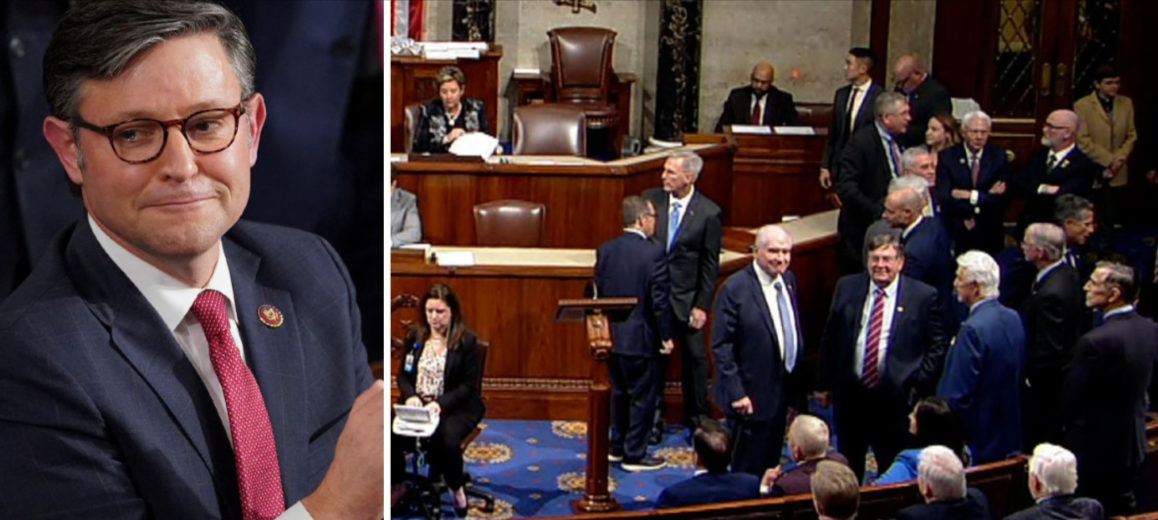House Passes Bill Blocking Future Presidents From Banning Oil Drilling Without Congress’ Approval

The Republican-led House approved legislation with a vote of 226 to 188, aiming to prevent future administrations from restricting oil and gas drilling without congressional approval.
Known as the “Protecting American Energy Production Act,” the bill was passed on Friday, prohibiting any president from “declaring a moratorium on the use of hydraulic fracturing unless Congress authorizes the moratorium.”
Republicans in the House unanimously supported the bill, while 118 Democrats opposed it.
The legislation comes in response to former President Joe Biden’s decision, made just weeks before leaving office, to halt future oil and gas drilling across 625 million acres of coastal and offshore waters, alongside other energy regulations.
Rep. August Pfluger of Texas, who introduced the bill, cited concerns about potential fracking bans under the Biden administration as the driving force behind the legislation.
“When President Biden took office, his administration took a ‘whole of government’ approach to wage war on American energy production, pandering to woke environmental extremists and crippling this thriving industry,” Pfluger stated after the bill’s passage.
“My legislation that passed today is a necessary first step in reversing Biden’s war on energy by preventing the federal government from banning the use of hydraulic fracturing,” he added.
Former President Donald Trump has long championed his “drill, baby, drill” strategy, advocating for expanded domestic energy production since his campaign.
Should the bill become law, it would ensure that no future administration can impose a ban on hydraulic fracturing.
On Monday, Secretary of the Interior Doug Burgum initiated internal investigations into agency policies that “burden” energy development. The review aims to remove what he described as “coercive” climate regulations and oil lease bans established under the Biden administration.
The House vote coincided with a concerning moment involving Rep. John Larson, who suddenly appeared to freeze in the middle of his speech on the House floor.
His office later attributed the incident to an “adverse reaction” to new medication.
Larson, a 76-year-old Democrat from Connecticut, had been delivering remarks about Social Security concerns following reports that the Trump administration had shared sensitive payment data with Elon Musk via the US Treasury Department.
During his five-minute speech, he suddenly halted, struggling to articulate his words.
“Don’t worry, no one on the Republican side of the House and US Senate who control both the House and Senate is going to speak up—,” Larson began before stopping abruptly, staring ahead as if trying to regain his composure.
“And challenge us…,” he continued slowly, his speech slightly slurred. “But we need to … protect Americans’ privacy and … their Social Security.”
While Larson gradually regained his footing, there was a noticeable contrast between how he started and how he finished. His energy seemed to wane as he attempted to push through the apparent effects of the medication.
After a video of the moment circulated on X, his office swiftly issued a statement addressing the situation.
“Congressman Larson appreciates the well wishes from everyone who has reached out. This afternoon, he had what was likely an adverse reaction to a new medication and is having tests administered by the House Attending Physician out of an abundance of caution,” his team stated.
“He later participated in multiple meetings in his office and was alert and engaged. The Congressman remains in touch with his staff and in good spirits,” they added.
WATCH:
WATCH: Dem Rep. John Larson appears to suffer medical emergency during floor speech pic.twitter.com/HTySBnuSHt
— Breaking911 (@Breaking911) February 11, 2025
Concerns over medical episodes among aging politicians have been growing, particularly in the Senate, where the average member’s age is around 65, according to the Pew Research Center.